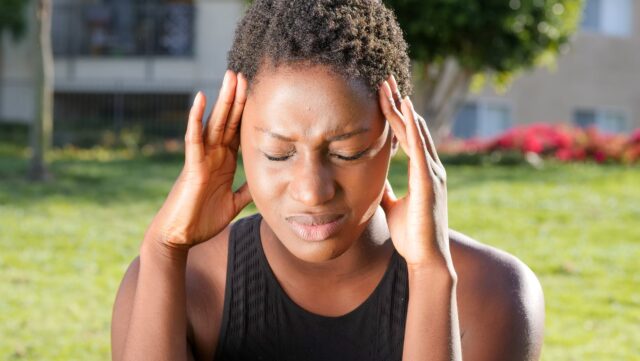
A migraine is not just a bad headache; it’s a neurological disorder that can be debilitating.
The pain from this neurological condition often leaves patients incapacitated, bedridden, and in need of relief for days on end. In today’s article, we’ll discuss the common causes behind migraines and how you can treat your symptoms effectively, so they don’t have such an impact or last longer than necessary.
Causes of Migraines

1. Stress
If you’re feeling stressed, it’s time to take a break. Certain emotions such as anxiety or worry can trigger migraine headaches. When this intense feeling takes hold of your body altogether with pain at its center, there are two options: flight or fight response. Chemicals related to fear are released into the bloodstream, and these chemicals cause migraines.
2. Hormonal Changes in Women
For many women, their menstrual cycle and the drop in estrogen that comes with it can be a trigger for migraines. Hormonal changes can also result from hormone replacement therapy and birth control pills, which may also bring on these headaches.
Women undergoing menopause and teenagers in their puberty years are also at a higher risk of developing migraines due to the hormonal changes that occur during these periods.
3. Missing or Delaying Meals
One of the most common ways migraine triggers is missing or delaying meals. Eating healthy and sticking with regular mealtimes can help prevent this from happening.
4. Light
For anyone who gets migraines from bright lights, watching TV or looking at computer screens may be a trigger. Migraines cause increased sensitivity to lights; if you prefer to avoid these triggers, try not to look at any screens when experiencing migraine symptoms, and use computer glasses or sunglasses where there are bright lights.
5. High Caffeine Intake and Withdrawal
A recent study found that high caffeine intake was linked with an increased risk for frequent migraines, so it’s best to avoid caffeinated drinks if this sounds like something you struggle with. Caffeine is a powerful stimulant that may increase your stress levels. When stressed, your body goes into a state of high alertness which can lead to migraines.
Caffeine is highly addictive, and when some people go without it for a while, their bodies start craving the substance. This causes them to experience withdrawal-related symptoms such as migraine headaches. Other common triggers include:
• Exhaustion
• Lack of sleep
• Exposure to fumes, perfumes, and other odors
• Dieting
• Changing weather conditions
• Loud noises
• Medication
Factors That Make You More Vulnerable to Migraines
• Smoking dilates your blood vessels
• Gender: Women are at a higher risk of suffering from migraines due to regular hormonal changes
• Genetics: Migraines run in families. If you suffer from one, there’s a high chance it’s in the family history
Symptoms of a Migraine

A migraine can be categorized by different phases, and each stage has its own set of type-appropriate symptoms. The four phases of a migraine include:
• Prodrome
• Aura
• Headache
• Postdrome
a) Prodrome Phase
This is the first stage of a migraine. You may or may not experience it, and it lasts only a few hours, but in some cases, it goes on for days. The common symptoms that characterize this stage include:
• Experiencing difficulty in speaking and reading
• Fatigue
• Difficulty sleeping
• Irritability
• Nausea
• Sensitivity to sound and light
• Muscle stiffness
• Increased urination
• Food cravings
• Low attention span
b) Aura
This is the second stage of a migraine, and it lasts between five and 60 minutes. Only a few people experience the aura, and when they do, it mostly comes with headaches. The symptoms of an aura include:
• Weakness: Mostly experienced on one side of the body
• Hallucinations
• Temporary sight loss
• Numbness and tingling.
• Changes in speech
c) Headache
This is the third and worst stage of a migraine and can go for up to 72 hours. It starts on one side and spreads across the other, causing intense pain. Along with headaches, other symptoms include;
• Sensitivity to sound, smell, and light
• Nasal congestion
• Insomnia
• Anxiety and depression
• Neck stiffness or neck pain
• Nausea and vomiting
d) Postdrome
Often referred to as the migraine handover, this is the last stage. Most people who suffer from migraine experience it. Some signs to watch out for include:
• Lack of comprehension
• Inability to concentrate
• Feelings of depression
• Euphoria
• Fatigue
How to Treat Migraines

Migraine headaches are incurable, but they have a lot of potential for improvement with proper management and possibly even some level-headedness. There are medical treatments like prescription drugs or over-the-counter medications and non-medical remedies.
Medical Treatment for Migraines

There are two ways to treat migraines medically:
1) The Abortive Approach
This approach involves taking medication when you experience the first symptoms of a migraine to prevent its development. Medication at this stage helps constrict the dilating blood vessels to relieve pain.
2) The Prophylactic Approach
Also referred to as the preventive approach, it involves the administration of medicine when you experience regular severe headaches. The drugs are prescribed for daily use to prevent a future occurrence. There are FDA-approved over-the-counter medicines for migraine relief that include:
• Advil® Migraine
• Excedrin® Migraine
• Motrin® Migraine Pain
While OTC medicines are also effective for migraine pain relief, it’s best to consult your doctor and get prescription drugs instead. Common prescription medication for migraine pain relief include;
• Gene-related antibodies such as Galcanezumab, Erenumab, Eptinezumab, and Fremanezumab
• Antidepressants such as Doxepin, Amitriptyline, Nortriptyline, Duloxetine, and Venlafaxine
• Valproic acid and Topiramate (antiseizure drugs)
• Verapamil-channel blocks
• Propranolol, Atenolol, and Nadolol (Beta Blockers)
• Abortives such as Naratriptan, Zolmitriptan and Sumatriptan
• Minerals/ supplements like Riboflavin (vitamin B2), Co-enzyme Q10, Feverfew, Butterbur, and Magnesium
Check out this site for more information on medical treatments for migraines.
Non-Medical Remedies for Migraine Headaches

Good Eating Habits
The best way to prevent stress-triggered migraines is by eating wisely. Consistency, not skipping meals, and keeping track of what you eat are all important factors in preventing this painful condition from occurring again.
Regular Exercises
Exercise regularly to prevent stress-triggered migraines. It also relieves anxiety and depression, which are common triggers of the condition. Maintaining a healthy weight through exercise can provide additional benefits in managing these headaches for you.
Get Enough Sleep
Getting a good night’s sleep is one of the best things you can do for your health. It reduces stress, anxiety, and depression; all factors that increase your chances of getting migraines.
Avoid Stressors or Manage Them
The best way to avoid stress-triggered migraines is by keeping it under control. Stress can be a major cause of migraine headaches, so you need some tricks up your sleeve. You can do this by keeping yourself occupied with fun activities, getting enough sleep, and taking breaks from overwhelming activities.
Keep a Migraine Diary
Every time you experience a migraine, note down the possible causes, for example, what food you ate before the migraine, activities you were engaged in, so you can avoid them altogether.
Did you know that stress is the number one cause of migraines? Stress can be a trigger for many other health problems, so it’s important to monitor your levels and take care of yourself. Eating regular meals, taking breaks from work or study, getting enough sleep and managing caffeine intake are all helpful ways to prevent migraine headaches. If these tips don’t help alleviate symptoms, talk with your doctor about how best to treat them with medicines.









